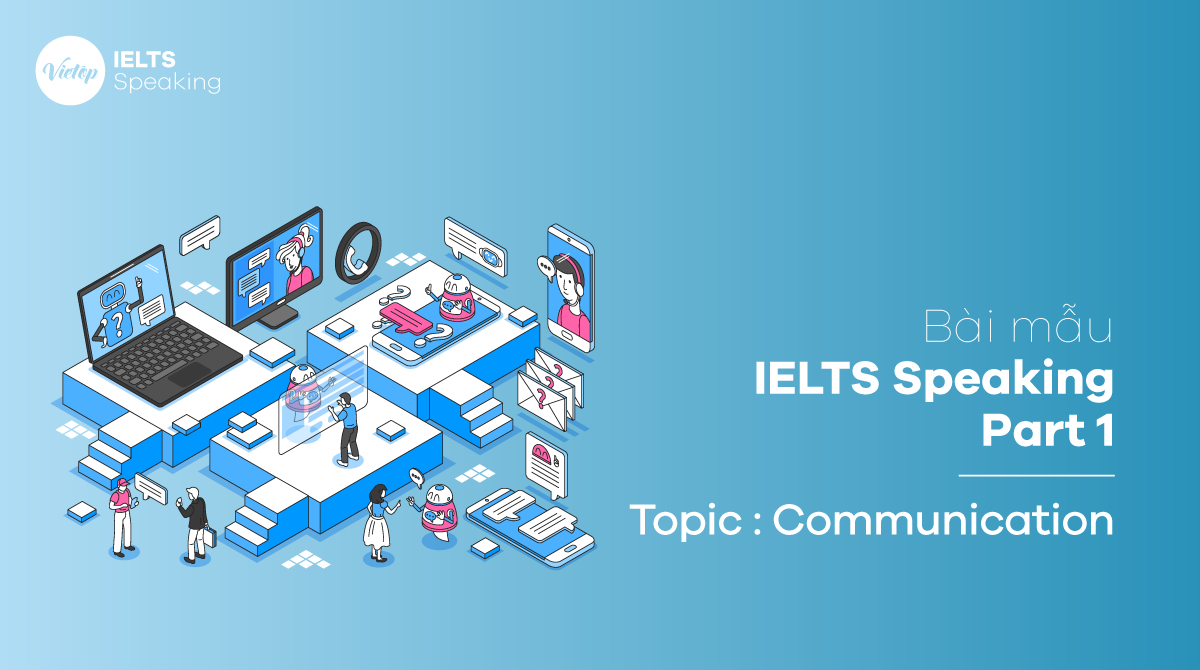Topic Communication là một trong những chủ đề hay trong IELTS Speaking nói chung và IELTS Speaking Part 1 nói riêng. Để đạt điểm cao trong bài thi IELTS Speaking, hãy cùng Vietop tham khảo các câu trả lời mẫu cho chủ đề Communication – IELTS Speaking Part 1 nhé!
1. Sample topic Communication – Your favorite way to communicate

Mời các bạn nghe Audio Topic Communication – Sample: Your favorite way to communicate tại đây nhé!
1.1. How do you usually keep in touch with members of your family?
I give them a call every day. Nowadays, almost everyone owns a cellphone, so keeping in touch is not a big concern. It’s easier when you can talk on the phone while completing other tasks, such as doing household chores or going out.
- Give sb a call (v): Gọi điện thoại cho ai đó
- Keep in touch (v): Giữ liên lạc
- Big concern (n): Vấn đề lớn
1.2. Which is your favorite way to communicate? Why?
My favorite way to communicate is texting messages. The reason I now adore text messages more than phone conversations is that, unlike phone calls, the person you’re contacting doesn’t feel obligated to answer immediately. They might take a few hours to react if they’re in the middle of anything, but the chat will go on regardless of the delay.
- Obligated (a): bắt buộc phải
- In the middle of: đang làm dở
- Regardless of: Bất kể
1.3. What do you think is the best way to keep in touch with friends?
How distant you are from your buddies will determine this. If you live close together, arrange a face-to-face meeting. When communicating across a long distance, body language and tone of voice are absent, which can lead to misunderstandings and animosity building up.
- Distant (adj): xa
- Buddy (n): bạn bè
- Determine (v): quyết định
- Face-to-face meeting (n): Cuộc gặp mặt trực tiếp
- Misunderstandings (n): Sự hiểu nhầm
- Animosity (n): Sự thù ghét
Luyện IELTS 4.0 hiệu quả với chi phí hợp lý. Đăng ký ngay khóa học IELTS 4.0 của IELTS Vietop

Nhận tư vấn miễn phí khóa học hè
2. Sample: Communication by Emails and Handwriting
Mời các bạn nghe Audio Topic Communication – Sample: Communication by Emails and Handwriting tại đây nhé!
2.1. Do you ever write letters by hand? Why/Why not?
Oh sure, it’s pretty interesting, and this is one of the rare occasions when I’d use a fountain pen to write something. A SMS or email might occasionally come across as somewhat impersonal. Handwritten notes for thank yous, welcomes, farewells, etc. are quite sweet.
- Fountain pen (n): Bút máy
- Come across (v): xuất hiện
- Impersonal (adj): vô cảm
- Farewell (n): sự kiện chia tay
2.2. At work or in your studies, do you often write things?
Yes, a large portion of my work is writing emails. Email is the primary form of communication for the company I work for because we have offices throughout the world.
- A large portion of (n): Một phần lớn
- Primary (adj): Chính
2.3. How often do you send emails?
I generally write five to ten emails for business each day, and once or twice a week, I send emails to friends or family.
- Generally (adv): thông thường
- For business: cho công việc
2.4. Do you think computers might one day replace handwriting?
Because everything is done electronically now, I assert that the process of changing from handwriting to computers is progressing slowly. However, it’s crucial that kids learn to write, including their names, numbers, and cursive.
- Electronically (adv): Điện tử
- Assert (v): cho rằng
- Crucial (adj): quan trọng
- Cursive (n): Chữ viết ẩu
Tham khảo:
- Bài mẫu Topic Handwriting – IELTS Speaking Part 1
- Bài mẫu Topic Books – IELTS Speaking Part 1
- Bài mẫu Topic Business – IELTS Speaking Part 1
3. Sample: Communication by Telephoning
Mời các bạn nghe Audio Topic Communication – Sample: Communication by Telephoning tại đây nhé!
3.1. How often do you make telephone calls?
Every day, I make three to four phone calls, mainly merely to set up meetings with coworkers or to speak with friends and family.
- Merely (adv): đơn giản là
- Set up meetings (v): sắp xếp các cuộc gặp mặt
- Coworker (n): Đồng nghiệp
3.2. Who do you spend the most time talking to on the telephone?
It would probably be one of my closest coworkers. We frequently speak on the phone rather than in person.
- Frequently (adv): thường xuyên
- In person: gặp mặt riêng
Xem thêm: Bảng chữ cái tiếng Anh
3.3. Do you prefer to speak to people by phone or by writing emails?
Depending on the circumstances. I contact friends via email and text messages, but my parents would rather I call them.
- Contact sb via st (v): Liên lạc với ai qua
- Would rather (v): muốn
3.4. Is there anything you dislike about mobile phones?
Well, I don’t enjoy it when people’s phones ring in a movie theater or during a lesson, and I don’t like to listen to other people’s discussions in public.
- Discussion (n): cuộc thảo luận
- In public: Công khai
3.5. Do you sometimes prefer to send a text message instead of telephoning?
Yes. When I’m setting up something basic, like an appointment to meet someone, I prefer to send a text message. A phone call is not necessary in those circumstances.
- Appointment (n): cuộc gặp mặt
- Circumstance (n): Hoàn cảnh
4. Sample: Communication in the Future
Mời các bạn nghe Audio Topic Communication – Sample: Communication in the Future tại đây nhé!
4.1. Do people keep in touch differently now compared to fifty years ago?
Of course, nowadays, people utilize both the Internet and cell phones. Even though I was a teenager, no one in my close group of friends had a mobile phone. These days, having one is considered essential, and not having one would make you feel excluded. However, as I’ve already stated, I believe that talking in person is preferable to using technology for communication. There are several benefits to communicating in “traditional” ways.
- Utilize (v): tận dụng
- Excluded (adj): Xa cách, cô lập
4.2. How do you think will people communicate in the future?
For communication, I predict that only technology will be used. People will most likely communicate with one another mentally. There will be technologies that allow people to communicate their ideas to another person. It may even be possible for individuals to connect with and interact with the other person virtually.
- Predict (v): dự đoán
- Likely (adv): có khả năng
- Mentally (adv): Thuộc về tinh thần
- Virtually (adv): theo cách thực tế ảo
Hy vọng rằng qua bài viết này, các bạn học tiếng Anh nói chung và học IELTS nói riêng sẽ có được góc nhìn tổng quan nhất về chủ đề Communication – IELTS Speaking Part 1.
Chúc các bạn học tốt kỹ năng IELTS Speaking!











